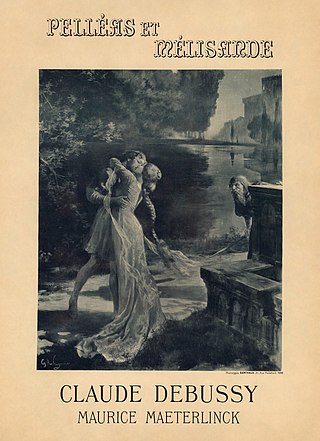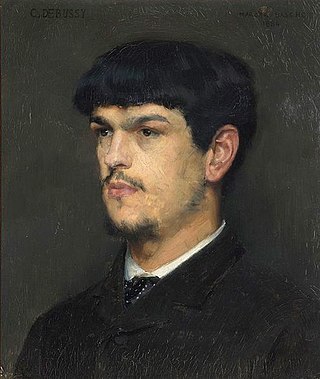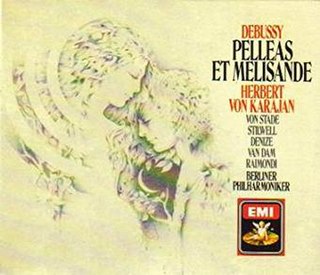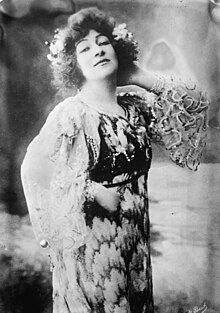
(Achille) Claude Debussy was a French composer. He is sometimes seen as the first Impressionist composer, although he vigorously rejected the term. He was among the most influential composers of the late 19th and early 20th centuries.

Paul Abraham Dukas was a French composer, critic, scholar and teacher. A studious man of retiring personality, he was intensely self-critical, having abandoned and destroyed many of his compositions. His best-known work is the orchestral piece The Sorcerer's Apprentice, the fame of which has eclipsed that of his other surviving works. Among these are the opera Ariane et Barbe-bleue, his Symphony in C and Piano Sonata in E-flat minor, the Variations, Interlude and Finale on a Theme by Rameau, and a ballet, La Péri.

Maurice Polydore Marie Bernard Maeterlinck, also known as CountMaeterlinck from 1932, was a Belgian playwright, poet, and essayist who was Flemish but wrote in French. He was awarded the Nobel Prize in Literature in 1911 "in appreciation of his many-sided literary activities, and especially of his dramatic works, which are distinguished by a wealth of imagination and by a poetic fancy, which reveals, sometimes in the guise of a fairy tale, a deep inspiration, while in a mysterious way they appeal to the readers' own feelings and stimulate their imaginations". The main themes in his work are death and the meaning of life. He was a leading member of La Jeune Belgique group and his plays form an important part of the Symbolist movement. In later life, Maeterlinck faced credible accusations of plagiarism.

"Bluebeard" is a French folktale, the most famous surviving version of which was written by Charles Perrault and first published by Barbin in Paris in 1697 in Histoires ou contes du temps passé. The tale tells the story of a wealthy man in the habit of murdering his wives and the attempts of the present one to avoid the fate of her predecessors. "The White Dove", "The Robber Bridegroom" and "Fitcher's Bird" are tales similar to "Bluebeard". The notoriety of the tale is such that Merriam-Webster gives the word "Bluebeard" the definition of "a man who marries and kills one wife after another". The verb "bluebearding" has even appeared as a way to describe the crime of either killing a series of women, or seducing and abandoning a series of women.

Pelléas et Mélisande is an opera in five acts with music by Claude Debussy. The French libretto was adapted from Maurice Maeterlinck's symbolist play of the same name. It premiered at the Salle Favart in Paris by the Opéra-Comique on 30 April 1902; Jean Périer was Pelléas and Mary Garden was Mélisande, conducted by André Messager, who was instrumental in getting the Opéra-Comique to stage the work. The only opera Debussy ever completed, it is considered a landmark in 20th-century music.

Pelléas and Mélisande is a Symbolist play by Maurice Maeterlinck about the forbidden, doomed love of the title characters. It was first performed in 1893.

Barbe-bleue is an opéra bouffe, or operetta, in three acts by Jacques Offenbach to a French libretto by Henri Meilhac and Ludovic Halévy based on Charles Perrault's 1697 story.
Bertrand de Billy is a French conductor.

Pelléas et Mélisande, Op. 80 is a suite derived from incidental music by Gabriel Fauré for Maurice Maeterlinck's play of the same name. He was the first of four leading composers to write music inspired by Maeterlinck's drama. Debussy, Schoenberg and Sibelius followed in the first decade of the 20th century.

Georgette Leblanc was a French operatic soprano, actress, author, and the sister of novelist Maurice Leblanc. She became particularly associated with the works of Jules Massenet and was an admired interpreter of the title role in Bizet's Carmen.
Deborah Polaski is an American opera and concert singer (soprano). She has specialized in dramatic soprano roles and also sings mezzo-soprano roles occasionally.
Ana James is a New Zealand-born operatic soprano who has appeared with The Royal Opera, the Glyndebourne touring ensemble, and Opera Holland Park as well as with opera companies in France and New Zealand.

Rodrigue et Chimène is an unfinished opera in three acts by Claude Debussy. The French libretto, by Catulle Mendès, is based on the plays Las Mocedades del Cid by Guillén de Castro y Bellvís and Corneille's Le Cid which deal with the legend of El Cid. It was first staged in a version completed by Edison Denisov in Lyon on 14 May 1993.

Félix Vieuille was a French operatic bass who sang for more than four decades with the Opéra-Comique in Paris during the first half of the twentieth century. He created roles in numerous world premieres, most notably portraying Arkel in the original production of Claude Debussy's Pelléas et Mélisande in 1902 which he went on to sing 208 times at that house. He possessed a rich voice and a solid technique which helped sustain his career for a long time. His voice is preserved on a number of recordings made on the Odeon, Lyrophon, and Beka labels.

Germaine Cernay, born Germaine Pointu was a French mezzo-soprano who was active both in the opera house and on the concert platform.
Claude Schnitzler is a French organist and conductor.

Suzanne Berchut, called Suzanne Balguerie was a French operatic singer. Admired by Fauré, Dukas, Poulenc, and Messiaen, she was one of the greatest sopranos of the interwar period.

Pelléas et Mélisande is a 162-minute studio album of Claude Debussy's opera, performed by Christine Barbaux, José van Dam, Nadine Denize, Ruggero Raimondi, Frederica von Stade, Richard Stilwell and Pascal Thomas with the Chorus of the German Opera Berlin and the Berlin Philharmonic Orchestra under the direction of Herbert von Karajan. It was released in 1979.
Kwangchul Youn is a South Korean operatic bass and academic voice teacher. He made an international career based in Germany, from 1994 to 2004 at the Berlin State Opera. He has performed leading roles at international opera houses and festivals, such as Gurnemanz in Parsifal at the Bayreuth Festival, Mephisto in Faust at the Vienna State Opera, and King Marke in Tristan und Isolde at the Metropolitan Opera.

Claus Guth is a German theatre director, focused on opera. He has directed operas at major houses and festivals, including world premieres such as works of the Munich Biennale, and Berio's Cronaca del luogo at the Salzburg Festival in 1999. Guth is particularly known for his opera productions of the works of Richard Wagner and Richard Strauss. He has received two Faust awards, for Daphne by Richard Strauss in 2010, and for Debussy's Pelléas et Mélisande, both at the Oper Frankfurt.
















